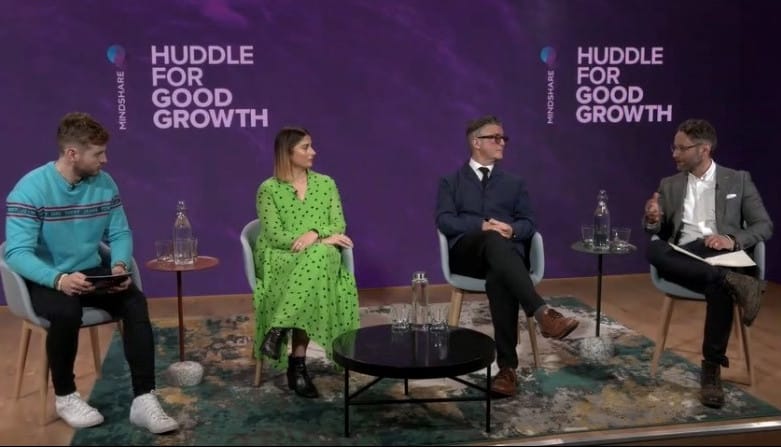Newsworks CEO Jo Allan implored advertisers to consider why they are not investing more heavily in trusted environments instead of unwittingly funding fake news
Setting the scene for the first day of Mindshare’s Huddle event, Allan gave a keynote demonstrating both the dangers of misinformation and how advertisers are caught up in it.
“We live in an online world blighted by fake news and misinformation,” she began.
“Back in 2018, the MIT found that false news spreads much faster on social than real news does, something like six times faster. Given everything we’ve been through in the last couple of years, 2018 feels like a lifetime ago.
“But what has changed? Has the volume and pace of fake news slowed in any way? Well, it would appear not: the issue of fake news has not gone away or slowed. In fact, it has got worse, become more pervasive and less easy to control.”
Beyond the social aspects, Allan also highlighted the business facts for advertisers unintentionally caught up in funding false information. “Fake news is clearly big business,” she stated.
“According to Newsguard and ComScore, advertisers unwittingly spend about £2 billion a year advertising on misinformation sites. In the UK alone, that figure is estimated to be about £110 million. That’s an eye-watering amount going to organisations and individuals who purposefully spread fake news and profit from it.”
Allan added: “This has real life consequences across all manner of world issues from climate to racism, migration and Covid, with the most vulnerable in society often the most impacted.”
Highlighting the awareness that many are starting to show around the issue, particularly surrounding climate coverage, Allan said news brands could be particularly instrumental in the fight against false information.
“Quality, trusted journalism is more important than ever and it is important in helping to tackle issues like climate change. Over the last 10 years, news brands have seen an impressive rise in readership, with a huge spike last year as millions more people than ever before sought out trusted information about coronavirus that they knew they could rely on.
“Every day, millions of people trust news brands to represent them, inform them, entertain them, inspire them, campaign for them and raise the issues that matter.”
The phasing out of cookies is making brands reconsider their marketing strategies beyond 2023, with contextual advertising discussed more and more. Allan remarked: “Seeing an ad in a quality environment drives greater engagement and better brand response.
“Context has always been fundamental to advertising, but in today’s world, the medium in which you advertise is as much the message as the actual message itself.”
Funding fact or fake
Her speech was followed by a panel session, chaired by Ben Rutherford, account director at Mindshare. He was joined by managing director and former editor of The Independent, Christian Broughton, Reach Solutions’ group account director, Lauren Horne and Mindshare CEO, Jem Lloyd-Williams.
Broughton talked about how important “human investment” is for journalism to combat fake news. “You can’t just automate AI [for] everything just yet,” he said. “You do need humans to… sniff out the truth.”
When asked about why journalism matters in a world full of misinformation, he switched the question around: what would a world without journalism look like?
“Imagine a world where you didn’t know what to believe,” he said. “If you actually had no idea whether Covid was spreading more or less…you didn’t know what was really going on in the third world, whether you didn’t really know whether climate change mattered. That’s what a world without journalism looks like. And it’s horrendous.”

From a practical perspective, Horne discussed how the industry is becoming easier to work with. Admitting that while the portfolios of publishers like Reach can seem complicated, she counted that more streamlined approaches and industry collaboration have opened up news brands to advertisers more than ever.
“Team Nation is a great example,” Horne said, talking about the long-running All Together government campaign to inform readers about vital Covid messaging. “We created this team, which was made up of people from all over the news industry to collaborate and work together to get the messaging out there quickly.”
On the advantages of news brands for delivering advertising effectiveness, she added: “[The news brand industry is] one of the only environments where advertising is actually welcomed. Because the reader or user has a long history of listening to what that newspaper or news brand is saying to them, they’re perfectly primed to receive an advertising message that can deliver brand metrics.”
While highlighting the innovation and creativity advertising can achieve on platforms outside of digital, Lloyd-Williams commented: “I think we are having to constantly educate ourselves on the opportunities that are available.”
At the end of the session, Lloyd-Williams spoke to clients directly, saying: “Ask us difficult questions… Really put us to the test. Make sure that we as a business and with our partners are giving you the best technological advice.”
“I don’t think any of [our clients] want to specifically under-support traditional journalism or support fake news,” he added. With clients wanting “surety” and results, Mindshare “[has] to be laser focussed on that” while ensuring effective platforms are not underutilised.

